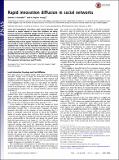| dc.contributor.author | Kreindler, Gabriel Emanuel | |
| dc.contributor.author | Young, H. Peyton | |
| dc.date.accessioned | 2015-02-05T17:12:19Z | |
| dc.date.available | 2015-02-05T17:12:19Z | |
| dc.date.issued | 2014-07 | |
| dc.date.submitted | 2014-02 | |
| dc.identifier.issn | 0027-8424 | |
| dc.identifier.issn | 1091-6490 | |
| dc.identifier.uri | http://hdl.handle.net/1721.1/93787 | |
| dc.description.abstract | Social and technological innovations often spread through social networks as people respond to what their neighbors are doing. Previous research has identified specific network structures, such as local clustering, that promote rapid diffusion. Here we derive bounds that are independent of network structure and size, such that diffusion is fast whenever the payoff gain from the innovation is sufficiently high and the agents’ responses are sufficiently noisy. We also provide a simple method for computing an upper bound on the expected time it takes for the innovation to become established in any finite network. For example, if agents choose log-linear responses to what their neighbors are doing, it takes on average less than 80 revision periods for the innovation to diffuse widely in any network, provided that the error rate is at least 5% and the payoff gain (relative to the status quo) is at least 150%. Qualitatively similar results hold for other smoothed best-response functions and populations that experience heterogeneous payoff shocks. | en_US |
| dc.description.sponsorship | United States. Office of Naval Research (Grant N00014-09-1-0751) | en_US |
| dc.description.sponsorship | United States. Air Force Office of Scientific Research (Grant FA9550-09-1-0538) | en_US |
| dc.language.iso | en_US | |
| dc.publisher | National Academy of Sciences (U.S.) | en_US |
| dc.relation.isversionof | http://dx.doi.org/10.1073/pnas.1400842111 | en_US |
| dc.rights | Article is made available in accordance with the publisher's policy and may be subject to US copyright law. Please refer to the publisher's site for terms of use. | en_US |
| dc.source | National Academy of Sciences (U.S.) | en_US |
| dc.title | Rapid innovation diffusion in social networks | en_US |
| dc.type | Article | en_US |
| dc.identifier.citation | Kreindler, Gabriel E., and H. Peyton Young. “Rapid Innovation Diffusion in Social Networks.” Proceedings of the National Academy of Sciences 111, no. Supplement_3 (July 14, 2014): 10881–10888. | en_US |
| dc.contributor.department | Massachusetts Institute of Technology. Department of Economics | en_US |
| dc.contributor.mitauthor | Kreindler, Gabriel Emanuel | en_US |
| dc.relation.journal | Proceedings of the National Academy of Sciences of the United States of America | en_US |
| dc.eprint.version | Final published version | en_US |
| dc.type.uri | http://purl.org/eprint/type/JournalArticle | en_US |
| eprint.status | http://purl.org/eprint/status/PeerReviewed | en_US |
| dspace.orderedauthors | Kreindler, Gabriel E.; Young, H. Peyton | en_US |
| dc.identifier.orcid | https://orcid.org/0000-0003-3847-7763 | |
| mit.license | PUBLISHER_POLICY | en_US |
| mit.metadata.status | Complete | |
